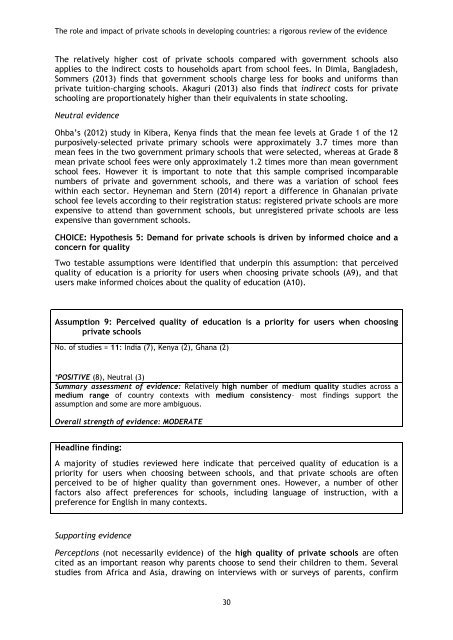private-schools-full-report
private-schools-full-report
private-schools-full-report
You also want an ePaper? Increase the reach of your titles
YUMPU automatically turns print PDFs into web optimized ePapers that Google loves.
The role and impact of <strong>private</strong> <strong>schools</strong> in developing countries: a rigorous review of the evidence<br />
The relatively higher cost of <strong>private</strong> <strong>schools</strong> compared with government <strong>schools</strong> also<br />
applies to the indirect costs to households apart from school fees. In Dimla, Bangladesh,<br />
Sommers (2013) finds that government <strong>schools</strong> charge less for books and uniforms than<br />
<strong>private</strong> tuition-charging <strong>schools</strong>. Akaguri (2013) also finds that indirect costs for <strong>private</strong><br />
schooling are proportionately higher than their equivalents in state schooling.<br />
Neutral evidence<br />
Ohba’s (2012) study in Kibera, Kenya finds that the mean fee levels at Grade 1 of the 12<br />
purposively-selected <strong>private</strong> primary <strong>schools</strong> were approximately 3.7 times more than<br />
mean fees in the two government primary <strong>schools</strong> that were selected, whereas at Grade 8<br />
mean <strong>private</strong> school fees were only approximately 1.2 times more than mean government<br />
school fees. However it is important to note that this sample comprised incomparable<br />
numbers of <strong>private</strong> and government <strong>schools</strong>, and there was a variation of school fees<br />
within each sector. Heyneman and Stern (2014) <strong>report</strong> a difference in Ghanaian <strong>private</strong><br />
school fee levels according to their registration status: registered <strong>private</strong> <strong>schools</strong> are more<br />
expensive to attend than government <strong>schools</strong>, but unregistered <strong>private</strong> <strong>schools</strong> are less<br />
expensive than government <strong>schools</strong>.<br />
CHOICE: Hypothesis 5: Demand for <strong>private</strong> <strong>schools</strong> is driven by informed choice and a<br />
concern for quality<br />
Two testable assumptions were identified that underpin this assumption: that perceived<br />
quality of education is a priority for users when choosing <strong>private</strong> <strong>schools</strong> (A9), and that<br />
users make informed choices about the quality of education (A10).<br />
Assumption 9: Perceived quality of education is a priority for users when choosing<br />
<strong>private</strong> <strong>schools</strong><br />
No. of studies = 11: India (7), Kenya (2), Ghana (2)<br />
*POSITIVE (8), Neutral (3)<br />
Summary assessment of evidence: Relatively high number of medium quality studies across a<br />
medium range of country contexts with medium consistency– most findings support the<br />
assumption and some are more ambiguous.<br />
Overall strength of evidence: MODERATE<br />
Headline finding:<br />
A majority of studies reviewed here indicate that perceived quality of education is a<br />
priority for users when choosing between <strong>schools</strong>, and that <strong>private</strong> <strong>schools</strong> are often<br />
perceived to be of higher quality than government ones. However, a number of other<br />
factors also affect preferences for <strong>schools</strong>, including language of instruction, with a<br />
preference for English in many contexts.<br />
Supporting evidence<br />
Perceptions (not necessarily evidence) of the high quality of <strong>private</strong> <strong>schools</strong> are often<br />
cited as an important reason why parents choose to send their children to them. Several<br />
studies from Africa and Asia, drawing on interviews with or surveys of parents, confirm<br />
30


